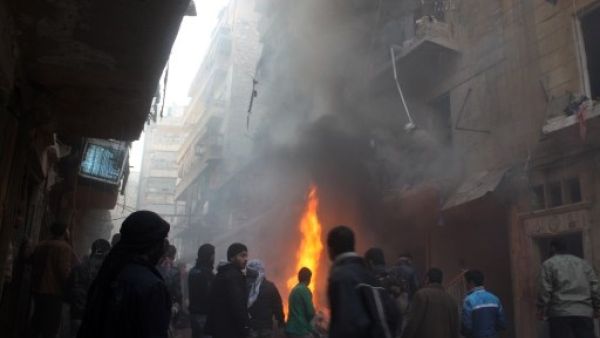There can be no peace negotiations in Syria before a cease-fire between warring parties, the U.N. chief said Monday, as government forces stepped up air assaults against opposition areas near the Jordanian border and in the northern city of Aleppo, where dozens were killed.
“We must have a cessation of hostilities before we begin political dialogue on Syria in Geneva,” Ban told reporters in New York. “This fighting must stop.”
Ban laid down the conditions for planned talks on Jan. 22 amid one of the heaviest government bombardments in months. The opposition Syrian Observatory for Human Rights revised Sunday’s death toll from Aleppo to 76, including at least 28 children, after a blitz in the city that saw government helicopters drop barrel bombs laden with explosives on residential compounds in a string of neighborhoods. The strikes continued Monday in Aleppo.
Syrian government aircraft also pounded opposition areas in Deraa province, near the southern border with Jordan. The Observatory said strikes hit the villages of Inkhil and Jassem, but there was no word on casualties.
“The people in Syria cannot afford another year, another month, even another day of brutality and destruction,” Ban said, adding that he planned to discuss a cease-fire with the Security Council.
Assad regime delegates and opposition forces, along with their rival international backers, are scheduled to meet in Geneva in January to try to put an end to nearly three years of fighting.
While the parties have broadly agreed in principle to the talks, there has been little agreement on details. The Syrian government wants talks without any preconditions, insisting Assad’s departure is not up for discussion. The opposition, meanwhile, remains divided, but the main Western-backed opposition body, the Syrian National Coalition, has insisted on Assad’s departure as a condition for talks.
Western-backed opposition fighters, meanwhile, are in disarray after a newly formed coalition of brigades, the Islamic Front, took control of weapons depots belonging to them.
Islamist factions have been making gains in the northern territories outside of Assad’s control. They reject participation in any talks outright and do not recognize the coalition or the authority of its military wing, the Supreme Military Council.
U.S. officials said Monday that they might meet commanders from the Islamic Front this week.
“State Department officials might be meeting with representatives of the Islamic Front this week,” State Department spokeswoman Jen Psaki said.
In an email to Reuters, she said Syria’s political opposition had started to seek contact with the Islamic Front, a step that “we welcome as the opposition prepares for the Geneva II conference.”
With just five weeks to go, opposition members and Western diplomats share a worry that even if any political agreement were reached in Switzerland, it would be futile if it were not backed by rebel fighters on the ground. With little progress made on the diplomatic front, a further row erupted between Russia and the U.S., the two main backers of the conference, at a U.N. Security Council meeting Monday over who is to blame for chemical weapons attacks in Syria.
“Acrimonious” talks were held at the closed meeting on a U.N. investigation into chemical weapons attacks, according to French Ambassador Gerard Araud.
Russia renewed allegations that the Syrian opposition staged attacks near Damascus in August and in other cities. The United States, Britain and France maintain that Assad’s forces carried out the attacks.
After the talks, Russia’s U.N. Ambassador Vitaly Churkin accused opposition rebels of staging an attack at Ghouta near Damascus on Aug. 21 in a bid to provoke a U.S. military strike.
“It is absolutely obvious that on Aug. 21 a wide-scale provocation was staged” by rebels “to provoke foreign military intervention,” Churkin told reporters.
Churkin said Russian requests for U.S. detail on Syrian government involvement in chemical attacks were “ignored” by Washington.
U.S. Ambassador Samantha Power hit back at the Russian accusations during the meeting, diplomats said.
Russia has “a remarkable trust in a government that sends rockets at – and bombs its own population,” Power was quoted as telling Churkin at the meeting.








